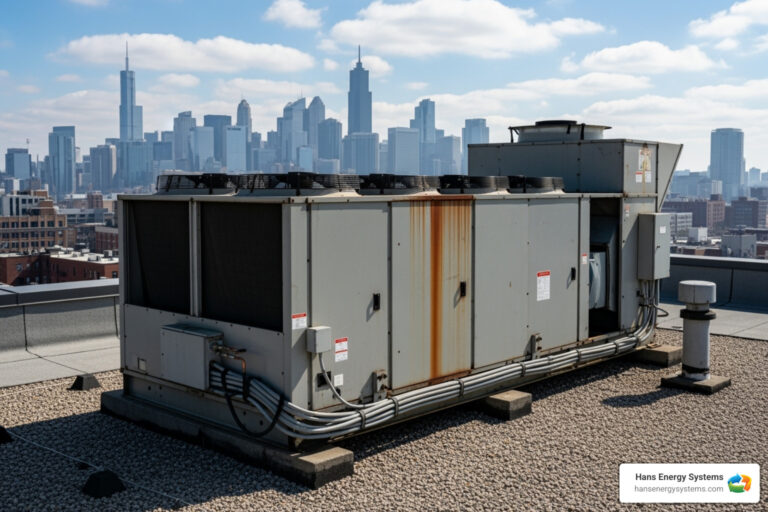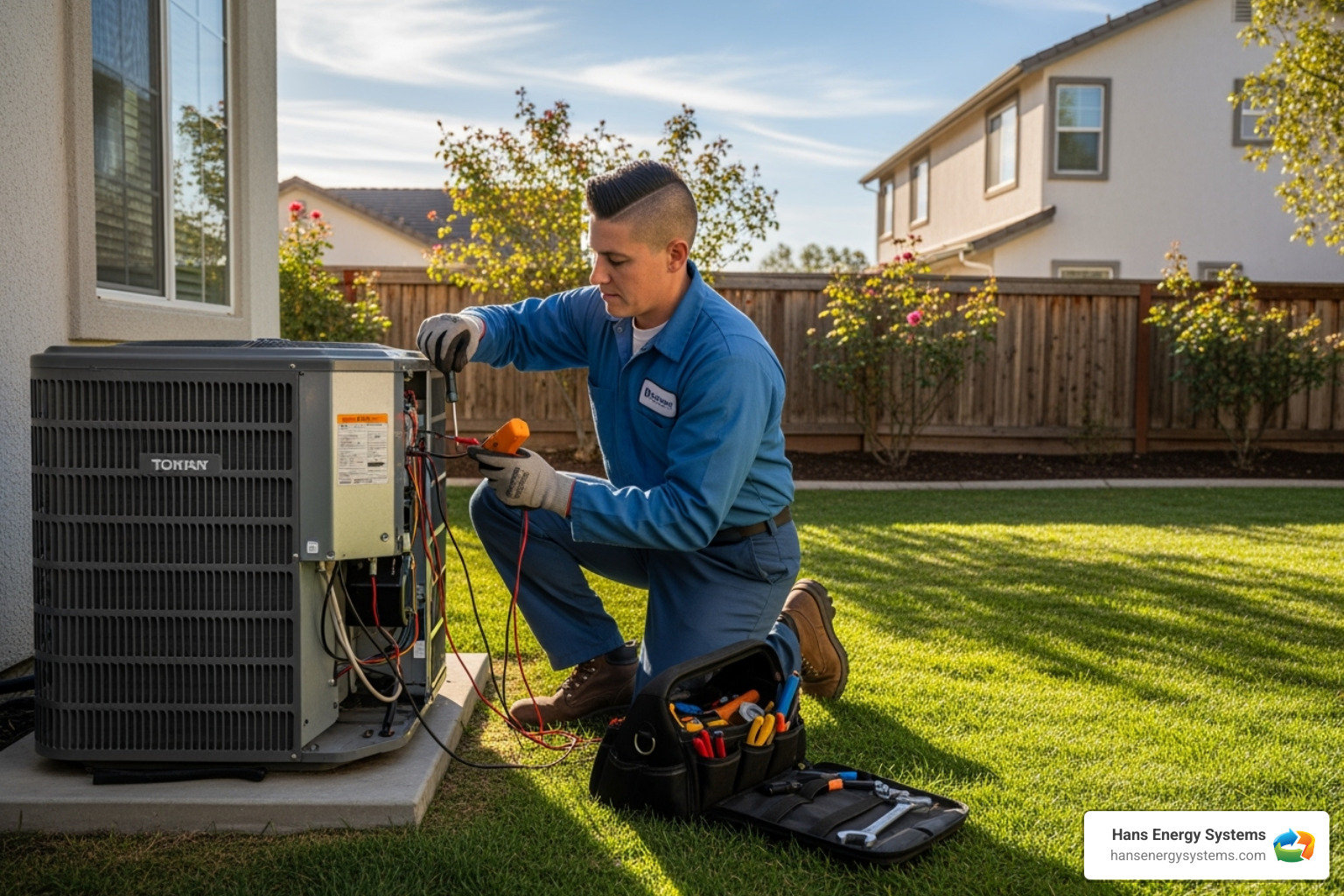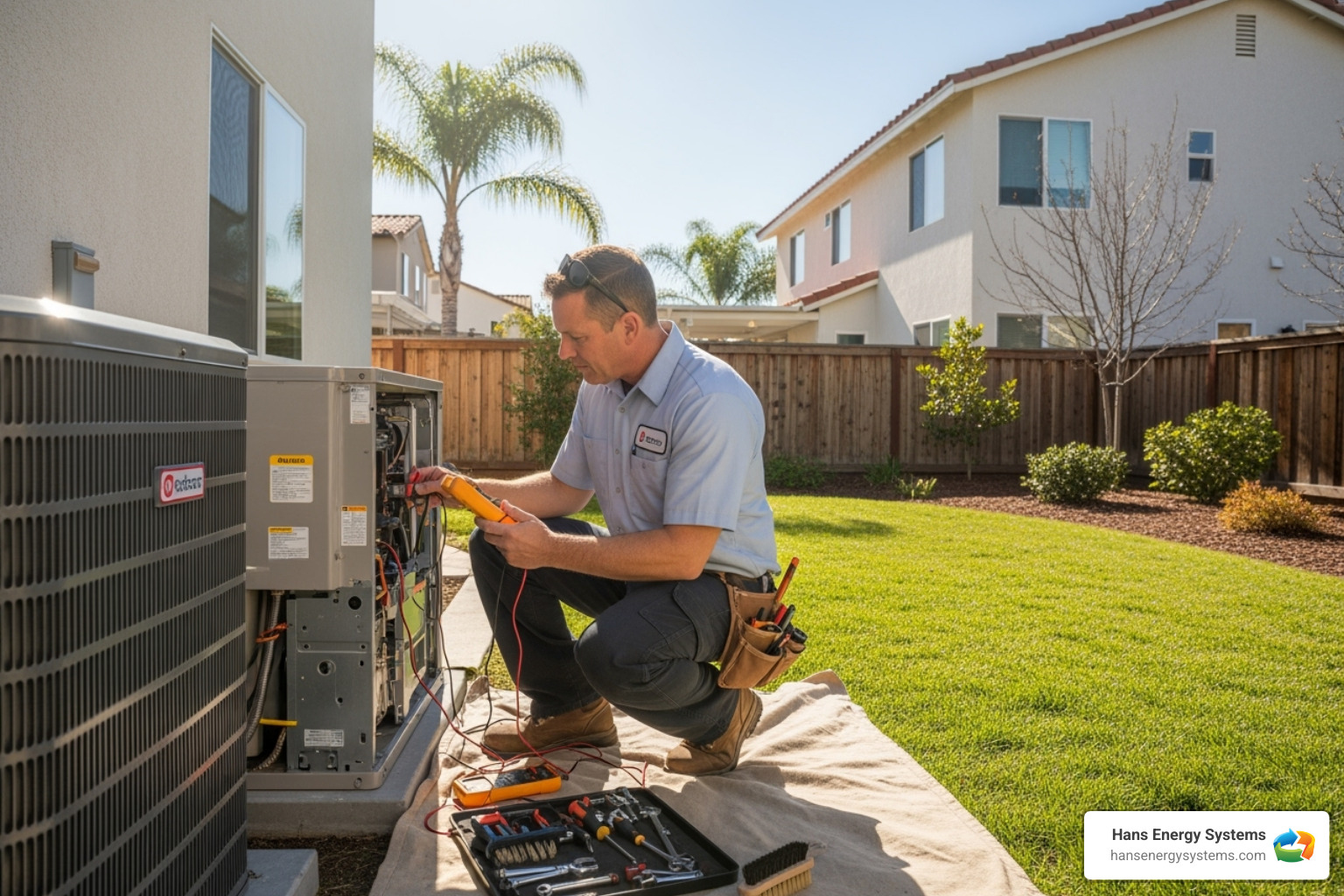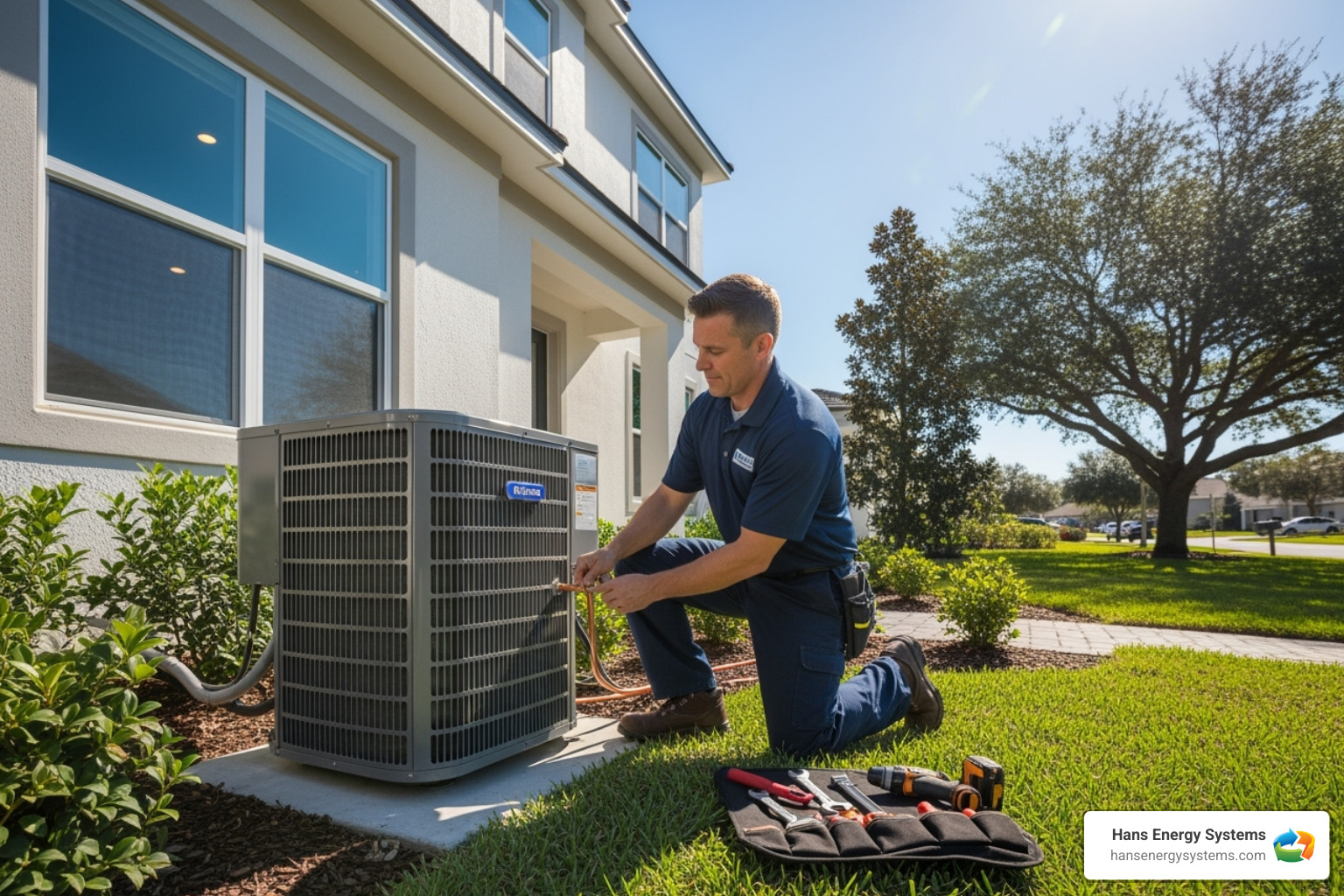Why Commercial HVAC Systems Are Critical for Business Success
Business HVAC repair is essential for maintaining uninterrupted operations, customer comfort, and employee productivity in commercial facilities. When your commercial heating, ventilation, and air conditioning system fails, it can force your doors to close and bring daily operations to a halt.
Key signs your business needs immediate HVAC repair:
- Unusual noises – rattling, banging, grinding, or squealing sounds
- Strange odors – musty, burning, or electrical smells
- Temperature inconsistencies – hot and cold spots throughout your facility
- Poor airflow – weak air circulation or blocked vents
- Rising energy bills – unexpected increases in utility costs
- Frequent cycling – system turning on and off repeatedly
Commercial HVAC systems are complex networks that require professional attention when problems arise. Unlike residential units, commercial systems often include rooftop units (RTUs), split systems, and extensive ductwork that serve much larger spaces and higher occupancy loads.
Research shows that regular maintenance can reduce HVAC downtime by 35-45 percent and prevent unexpected breakdowns by 70-75 percent. For businesses, this translates directly to avoiding costly interruptions, maintaining comfortable environments for customers and employees, and keeping energy costs under control.
The stakes are higher with commercial systems. A failed HVAC unit in a retail store can drive customers away, while temperature problems in an office can reduce employee productivity and comfort. Restaurant kitchens, medical facilities, and manufacturing spaces have even more critical requirements where HVAC failures can impact safety and compliance.
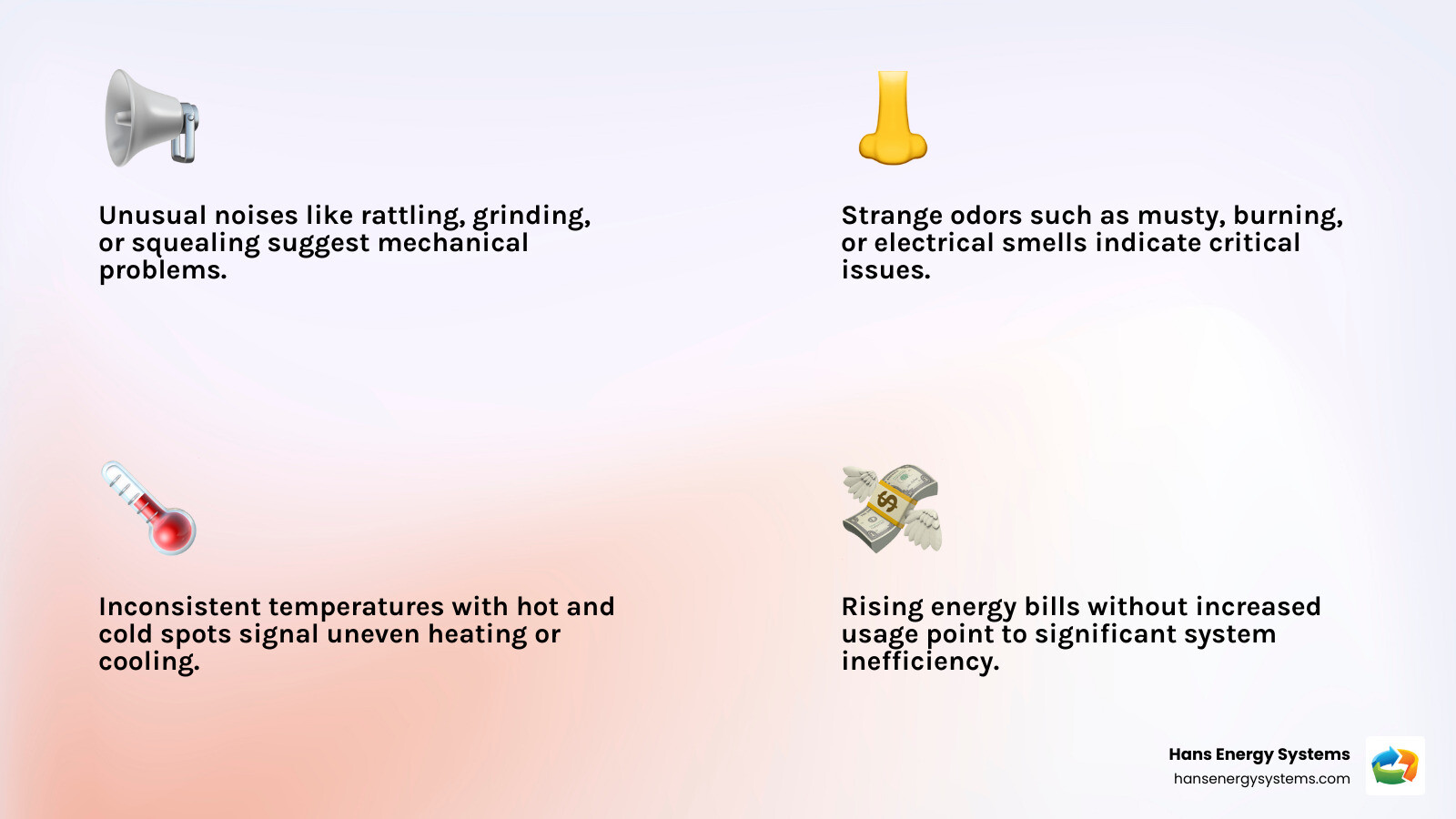
Recognizing the Red Flags: When to Call for Commercial HVAC Repair
Your business depends on a comfortable environment to keep customers happy and employees productive. When your HVAC system starts acting up, it’s like having a ticking time bomb in your building – the longer you wait, the bigger the explosion (and the repair bill).
The good news? Your commercial HVAC system usually gives you plenty of warning before it completely fails. Learning to recognize these warning signs can save you from emergency shutdowns, unhappy customers, and stressed employees wondering why it feels like the Arctic tundra in accounting while the break room feels like a sauna.
Unusual noises are often the first cry for help from your system. Strange odors floating through your vents are another dead giveaway. Inconsistent temperatures across your building, poor airflow from vents, increased energy bills that make you wonder if you accidentally air-conditioned the entire neighborhood, and frequent cycling where your system can’t seem to make up its mind about staying on or off – these are all your HVAC system’s way of saying “Help me!”
For more detailed information on heating-specific warning signs, check out our guide on signs you need heating repair in Poway.
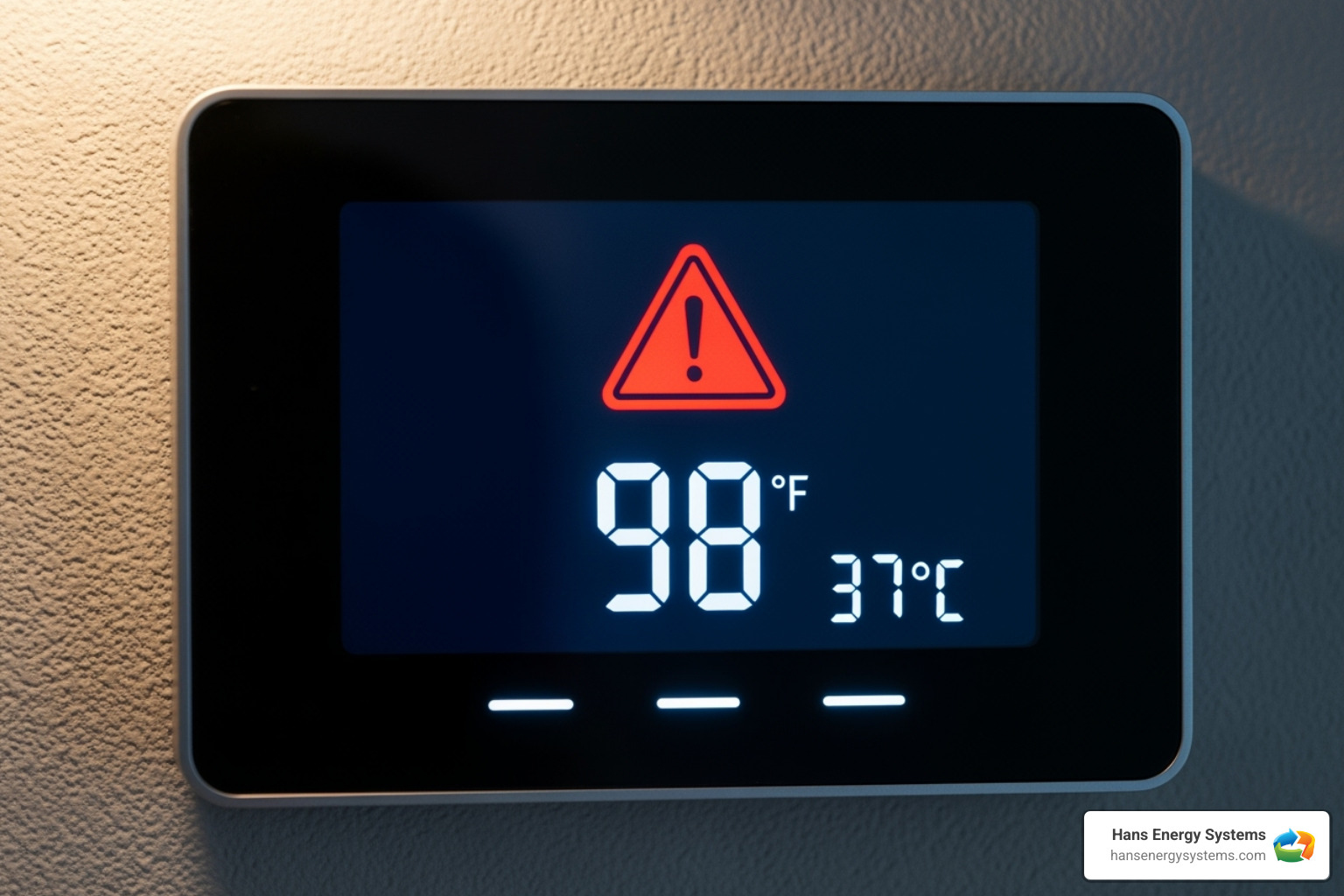
Telltale Sounds and Smells
Your HVAC system should hum along quietly in the background, like a well-behaved office worker. When it starts making noise like a rock concert, that’s your cue to call for Business HVAC repair.
Rattling or banging noises usually mean something has come loose inside your system. Think of it like a car with a loose muffler – annoying now, expensive later if you ignore it. These sounds often point to loose bolts, failing motors, or debris that’s found its way into places it shouldn’t be.
Grinding or squealing sounds are even more concerning. These high-pitched protests typically signal worn-out bearings in your motor. It’s like nails on a chalkboard, but your HVAC system is doing the scratching. Left alone, this can lead to complete motor failure.
When it comes to smells, your nose knows trouble. Musty or burning smells are never a good sign. That musty odor usually means mold or mildew has set up shop in your ductwork or coils – not exactly the air freshener you want for your business. A burning smell is even more alarming and could indicate overheating components or electrical problems.
Electrical odors – that sharp, acrid smell like burning plastic – should send you reaching for the phone immediately. This often signals dangerous electrical issues that need professional attention right away.
Performance and Efficiency Issues
Sometimes your HVAC system doesn’t make dramatic sounds or smells – it just stops doing its job well. These performance problems are just as serious as the noisy ones.
Visible leaks or moisture around your units are like finding water in your car’s trunk – it’s definitely not supposed to be there. Whether it’s refrigerant leaking, condensate backing up, or ice forming where it shouldn’t, moisture problems need immediate attention.
Uneven heating or cooling throughout your building creates uncomfortable hot and cold spots that make your space feel more like a weather experiment than a professional environment. This usually points to ductwork problems, thermostat issues, or an unbalanced system.
The worst-case scenario is when your system won’t turn on at all. This complete shutdown could stem from electrical issues, thermostat failures, or major component breakdowns. When your system goes completely silent, it’s time for emergency Business HVAC repair. Our guide on fixing a heating system that won’t turn on can give you more insights into these frustrating situations.
Common Culprits: Top Issues Requiring Business HVAC Repair
When your commercial HVAC system starts acting up, it’s usually not a mystery what’s gone wrong. After years of servicing businesses across San Diego County, we’ve seen the same issues pop up time and again. The good news? Most of these problems are completely fixable when you catch them early and work with experienced professionals who know what they’re looking for.
Business HVAC repair calls often stem from a handful of common culprits that affect everything from small retail shops to large office complexes. Understanding what typically goes wrong can help you spot trouble before it turns into a major headache. For a deeper dive into heating-specific issues, check out our comprehensive guide on heating problems and solutions in Poway.
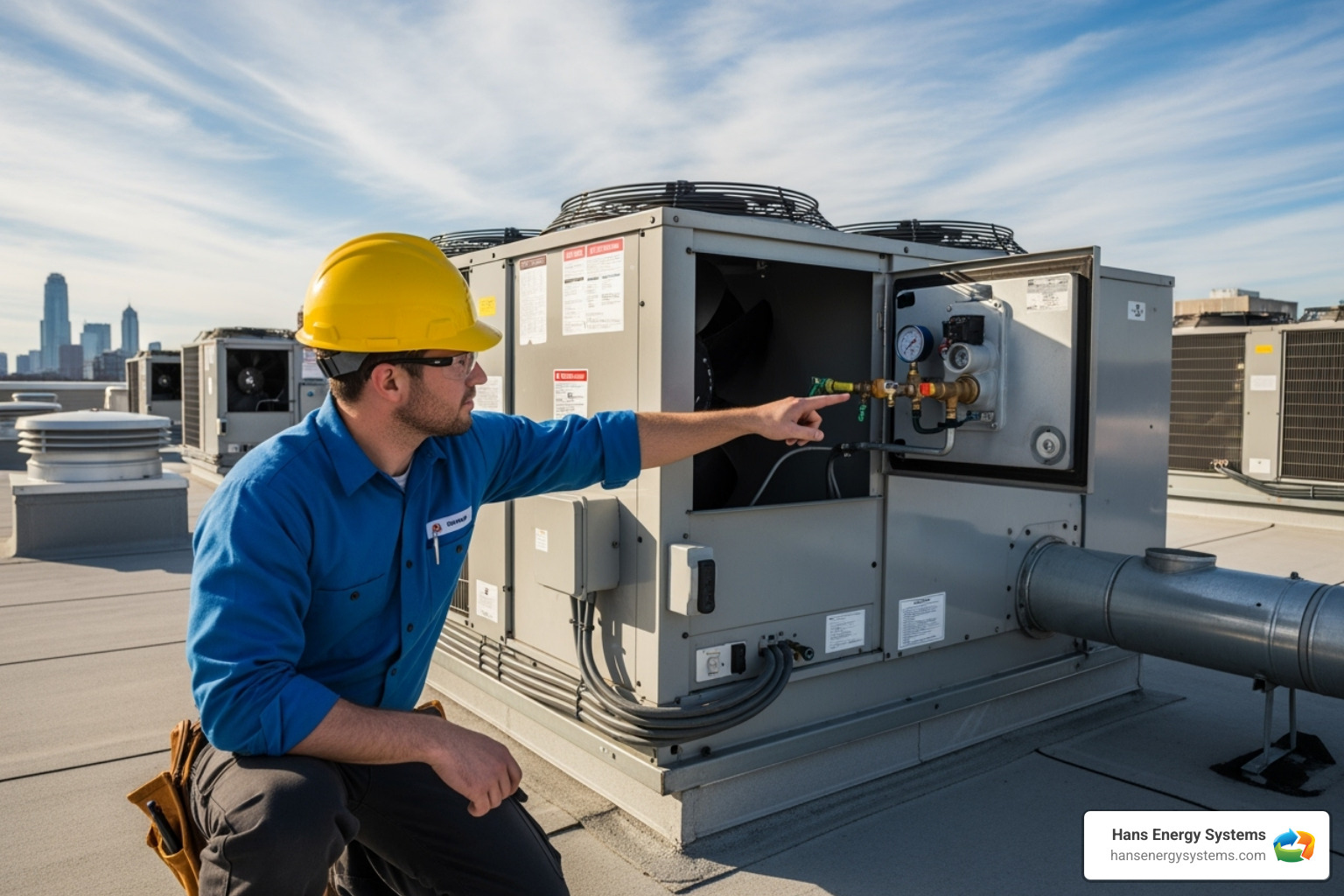
The reality is that commercial HVAC systems work hard every day, and all that constant operation takes its toll. Refrigerant leaks are among the most common issues we encounter, often caused by vibration, corrosion, or simply the natural aging of components. When refrigerant levels drop, your system can’t cool effectively, and it has to work much harder to maintain comfortable temperatures.
Clogged filters might seem like a small problem, but they’re responsible for a surprising number of service calls. When filters get packed with dust and debris, airflow drops dramatically. This forces your system to strain just to push air through, leading to higher energy bills and potential damage to other components.
Electrical failures are another frequent troublemaker in commercial settings. With all the complex wiring and electrical components in these systems, connections can loosen, wires can fray, and circuits can overload. Worn-out components like belts, bearings, and motors are simply a fact of life with any mechanical system, especially ones that run as much as commercial HVAC units do.
Don’t overlook thermostat malfunctions either. These control centers can develop problems that cause your system to cycle incorrectly, maintain wrong temperatures, or fail to respond to adjustments altogether.
Mechanical and Electrical Failures
The mechanical heart of your HVAC system contains dozens of moving parts, and when they start to fail, the effects ripple through your entire facility. Fan and blower problems are particularly common because these components work constantly to move air throughout your building. You might notice weaker airflow from your vents, strange rattling sounds, or hot and cold spots developing in different areas.
Compressor issues are more serious and often more expensive to address. The compressor is essentially the engine of your cooling system, and when it starts to fail, you’ll know it. Strange grinding noises, complete loss of cooling, or a system that won’t start at all are telltale signs that your compressor needs professional attention.
Faulty wiring creates safety concerns as well as performance problems. Loose connections can cause intermittent operation that’s frustrating and unpredictable. More seriously, damaged wiring can create fire hazards or cause expensive damage to other system components.
Tripped breakers might seem like a simple fix, but when they happen repeatedly, they’re telling you something important. Your system is drawing more power than it should, which usually means another component is working too hard or starting to fail.
System-Specific Repair Needs
Different types of commercial HVAC systems face their own unique challenges, and our team has the experience to handle them all. Rooftop units (RTUs) are workhorses that handle heating and cooling for many commercial buildings, but their exposed location makes them vulnerable to weather damage, debris buildup, and the gradual effects of sun and rain on their components.
Commercial split systems offer flexibility and efficiency, but they also have more connection points where problems can develop. Refrigerant lines between indoor and outdoor units can develop leaks, and the indoor air handlers can accumulate dust and moisture that affects performance.
Ductwork problems are often hidden but can waste enormous amounts of energy. Leaks in your ductwork mean you’re paying to heat or cool air that never reaches its destination. Poor insulation, damaged sections, or improperly designed duct runs can all impact your system’s effectiveness.
Drainage issues might not seem urgent, but they can quickly lead to water damage, mold growth, and system shutdowns. When condensate drains get clogged with algae or debris, water has nowhere to go except where it shouldn’t be.
The key to avoiding major problems is catching these issues early. Regular maintenance helps, but when problems do arise, working with certified technicians who understand commercial systems makes all the difference in getting your business back to comfortable operation quickly.
The Importance of Proactive HVAC Maintenance for Your Business
Picture this: it’s the hottest day of summer, your business is packed with customers, and suddenly your air conditioning decides to take an unscheduled vacation. Not exactly the scenario any business owner wants to face, right? This is precisely why proactive HVAC maintenance isn’t just a good idea – it’s essential for keeping your business running smoothly.
While Business HVAC repair becomes necessary when problems arise, regular maintenance is like having a crystal ball that helps you see and prevent issues before they happen. It’s the difference between being reactive and being smart about your business operations.
The numbers speak for themselves, and they’re pretty impressive. According to the Federal Energy Management Program, routine maintenance can slash downtime by 35-45 percent and prevent unexpected breakdowns by an amazing 70-75 percent. But what does this really mean for your day-to-day operations?
Reduced downtime means your doors stay open and your team stays productive. Every hour your HVAC system is down could mean lost revenue, uncomfortable customers, and frustrated employees. Lower energy costs happen naturally when your system runs efficiently – a well-maintained system doesn’t have to work overtime to keep everyone comfortable. Just replacing dirty filters can cut energy use by up to 15 percent according to Energy.gov.
Your commercial HVAC system represents a significant investment, and extended equipment lifespan means you get the most value from that investment. With proper care, commercial systems can serve your business reliably for about 20 years. Plus, improved air quality creates a healthier, more pleasant environment for everyone who walks through your doors.
For a deeper dive into how preventative maintenance can transform your commercial operations, we recommend checking out this comprehensive guide from Energy.gov.
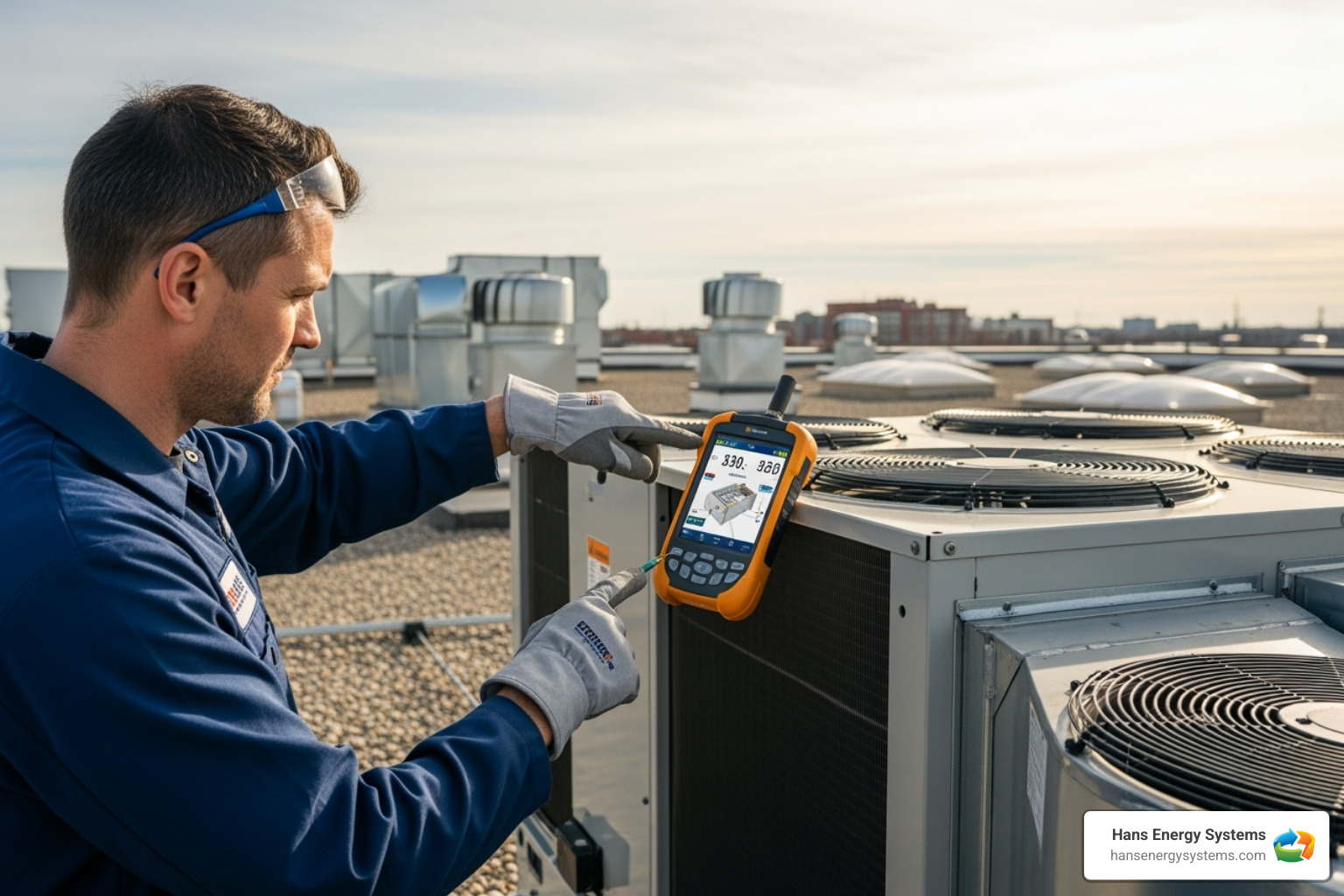
How Regular Maintenance Prevents Costly Repairs
Think of regular HVAC maintenance as your system’s annual check-up with the doctor. Just like catching health issues early can prevent serious problems down the road, catching HVAC issues during routine maintenance can save you from major headaches and expensive Business HVAC repair bills.
Filter replacement might seem like a small thing, but it’s actually one of the most powerful maintenance tasks you can do. When filters get clogged with dust and debris, your system has to work much harder to push air through, which wastes energy and puts unnecessary strain on components. Fresh filters keep the air flowing freely and your system happy.
Coil cleaning is another game-changer that many business owners don’t think about. Over time, your evaporator and condenser coils collect dirt and grime that acts like a thick blanket, preventing them from transferring heat effectively. Clean coils mean efficient operation and less stress on your compressor.
Your system’s belt and pulley inspection might sound technical, but it’s straightforward – these parts drive your fans and blowers, and when they wear out or get loose, you’ll hear about it through squealing noises and reduced airflow. Catching belt issues early prevents the inconvenience of a complete breakdown.
Refrigerant level checks ensure your cooling system has exactly what it needs to do its job. Too little refrigerant usually means there’s a leak somewhere, and your compressor will struggle to compensate. Our technicians check levels carefully and hunt down any leaks before they become bigger problems.
Finally, safety control testing makes sure all the protective systems in your HVAC unit are working correctly. These controls prevent overheating, freezing, and electrical problems that could damage your equipment or create safety hazards.
The Benefits of a Commercial HVAC Maintenance Plan
While calling for maintenance when you remember it is better than ignoring your system completely, having a structured maintenance plan is like having a personal assistant for your HVAC system. It takes the guesswork and worry out of keeping your business comfortable year-round.
Priority service means when you need us most – during those scorching summer days or unexpected cold snaps – you move to the front of the line. Your maintenance plan membership gets you faster response times when every minute counts.
Predictable budgeting transforms your HVAC expenses from surprise attacks on your finances into manageable, planned investments. Instead of crossing your fingers and hoping nothing breaks, you can budget confidently knowing your system is getting the care it needs.
The peace of mind that comes with a maintenance plan is honestly priceless. You can focus on what you do best – running your business – while we handle the behind-the-scenes work of keeping your environment comfortable and your operations running smoothly.
Most importantly, improved system performance means your HVAC system operates at its peak efficiency day after day. Your employees stay comfortable and productive, your customers enjoy their time in your space, and your energy bills stay reasonable.
Ready to learn more about how a structured maintenance approach can benefit your specific business needs? Take a look at our HVAC maintenance plan options designed specifically for businesses like yours.
Choosing the Right Partner for Your Commercial HVAC Needs
When your business depends on a properly functioning HVAC system, choosing the right service provider isn’t just another vendor decision – it’s choosing a partner who understands that your comfort directly impacts your success. At Hans Energy Systems, we’ve seen how the wrong HVAC partner can turn a simple repair into a business nightmare, while the right one becomes an invaluable ally in keeping your operations running smoothly.
The stakes are simply too high to settle for anything less than exceptional service. When your system goes down, every hour of delay can mean lost productivity, uncomfortable customers, and potential revenue loss. That’s why we’ve built our reputation on Business HVAC repair services that prioritize your business continuity above all else.
What should you look for in a commercial HVAC partner? Start with the licensed and insured requirement – this isn’t just a nice-to-have, it’s your protection. A proper license means the company meets industry standards and local regulations, while insurance shields your business from liability if something goes wrong during service.
Certified technicians are equally crucial. These aren’t just badges on a uniform; they represent hours of training, testing, and ongoing education. When a certified technician walks into your facility, you know they have the knowledge to handle your system safely and effectively.
Commercial experience sets apart providers who truly understand your needs. Residential HVAC work might seem similar, but commercial systems are entirely different beasts. They’re larger, more complex, and serve critical business functions that can’t wait for trial-and-error repairs.
24/7 emergency service isn’t optional for businesses. HVAC problems don’t check the clock before striking, and neither should your service provider. When your system fails at 2 AM on a Sunday, you need someone who answers the phone and shows up ready to work.
Finally, positive reviews from other business owners tell the real story. Look for feedback that mentions reliability, professionalism, and quick response times – these are the qualities that matter when your business is on the line.
For more information on our comprehensive commercial HVAC offerings, please visit our commercial services page.

Why Certified Technicians Matter for Your Business
Think of certified technicians as the difference between a mechanic who learned by watching YouTube videos and one who graduated from automotive school. When it comes to Business HVAC repair, that difference can mean the gap between a quick fix and a costly disaster.
EPA certification importance goes beyond just having the right paperwork. Every technician working on your commercial HVAC system must hold Environmental Protection Agency certification under Section 608 regulations. This certification ensures they know how to handle refrigerants safely and legally, protecting both your business and the environment. Without it, a technician can’t legally service your equipment, and using uncertified workers could land you in regulatory hot water. You can learn more about the requirements at the EPA certification page.
Safety standards become even more critical in commercial environments where a single mistake can affect dozens of employees and customers. Certified technicians undergo rigorous safety training, learning to identify potential hazards, follow proper lockout procedures, and work safely around high-voltage equipment and refrigerants.
Technical expertise is where certification really shines. Commercial HVAC systems are sophisticated machines with complex controls, multiple zones, and integrated building management systems. Certified technicians have demonstrated their knowledge through comprehensive testing and continuing education requirements. They stay current with new technologies, energy efficiency standards, and troubleshooting techniques that can save your business time and money.
Warranty protection often depends on using certified professionals. Many manufacturers require that repairs and maintenance be performed by properly certified technicians to maintain warranty coverage. Skip this requirement, and you might find yourself facing full replacement costs when a major component fails.
Questions to Ask a Potential HVAC Provider
Before you hand over the keys to your building’s comfort system, take time to ask the right questions. A reputable provider will welcome these inquiries and provide clear, confident answers.
Experience with your system type should be your first question. Commercial HVAC comes in many flavors – rooftop units, split systems, chillers, boilers, and variable refrigerant flow systems all have their quirks. Ask specifically about their experience with your exact system type and building size. A company that primarily services small retail spaces might not be the best fit for your large office complex.
Emergency response time can make or break your business during a crisis. Find out their typical response time for emergency calls, especially during peak seasons when demand is highest. Some providers offer guaranteed response times for maintenance plan customers, which can be invaluable during summer heat waves or winter cold snaps.
Parts availability directly impacts how quickly repairs get completed. Ask whether they stock common parts for your system type or if everything needs to be ordered. Local parts availability can mean the difference between a same-day repair and waiting several days for your system to be operational again.
Service guarantees show how confident a provider is in their work. Ask about warranties on both labor and parts, and find out what happens if the same problem occurs again shortly after a repair. A company that stands behind their work will offer clear guarantees and honor them without hassle.
Conclusion: Protecting Your Business with Reliable HVAC Service
Your HVAC system isn’t just another piece of equipment tucked away on your roof or in a utility room—it’s the invisible force that keeps your business running smoothly. When it’s working properly, nobody thinks about it. But when it fails, everyone notices, from uncomfortable customers to frustrated employees to mounting energy bills that eat into your profits.
The good news is that most HVAC emergencies are preventable. By staying alert to the warning signs we’ve discussed—those unusual noises, strange smells, and performance issues—you can catch problems before they spiral into costly disasters. That grinding sound or musty odor isn’t just annoying; it’s your system’s way of asking for help.
Understanding the common culprits behind Business HVAC repair needs gives you the power to communicate effectively with your service provider and make informed decisions about your system. Whether you’re dealing with a faulty compressor, clogged filters, or ductwork problems, knowing what’s happening helps you respond appropriately and quickly.
But perhaps most importantly, embracing a proactive maintenance approach transforms your relationship with your HVAC system from reactive crisis management to confident control. Regular maintenance doesn’t just prevent breakdowns—it saves energy, extends equipment life, and creates a more comfortable environment for everyone in your building.
When the time comes to choose a service partner, don’t settle for just anyone with a toolbox. Look for certified technicians who understand commercial systems, offer emergency service when you need it most, and have the experience and licensing to handle your specific needs professionally and safely.
At Hans Energy Systems, we’ve built our reputation on understanding that your business success depends on reliable comfort systems. We’re not just fixing equipment—we’re protecting your operations, your people, and your peace of mind. For expert Commercial HVAC Services in Poway, CA, trust our team to deliver the reliable solutions your business deserves.
Your HVAC system works hard for your business every day. Make sure you’re working with professionals who understand that responsibility and are committed to keeping your operations running smoothly, no matter what challenges arise.


